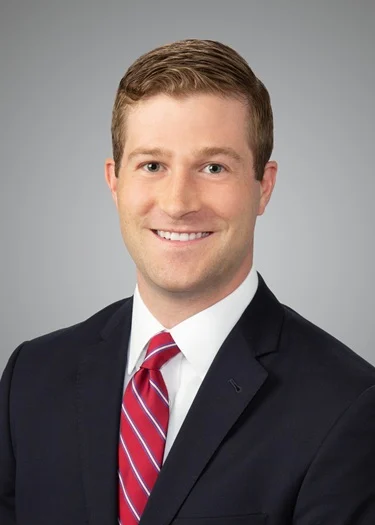Robert Uhl was two months into his legal career when he began working with veterans pro bono.
The Sidley Austin associate and 2018 graduate of SMU’s Dedman School of Law attended a pro bono clinic in November 2018 hosted by Sidley and a client, JPMorgan Chase, and the Metroplex Veterans Legal Services. Uhl and the other lawyers conducted intake interviews to identify veterans with potential claims for Combat-Related Special Compensation, a niche benefits category that the federal government sometimes awards to veterans who have experienced combat-related disabilities.
Uhl was paired with a Pilot Point-based Vietnam vet who had “seen a lot of combat” and “experienced some really terrible things.” Uhl later submitted a benefits application on the Vietnam vet’s behalf, which was approved in quick fashion.

Four years and more than 300 pro bono hours later, Uhl is still at it. To date, he has successfully scored combat-related benefits for veterans three times in a row — even though the often-exhaustive application process can require multiple rounds of appeals before success. Last week, he submitted a new application on behalf of a veteran client, so his track record may soon be 4-0.
Although he’s on a winning streak, the Dallas lawyer doesn’t continue this work to keep score. His dedication to it, he says, comes from a deep level of respect for the veterans who serve their country — including both of his grandfathers, who served in World War II and the Korean War.
“I’ve never served but certainly am thankful to those who have,” Uhl said. “The money itself is less important to [the veterans] than just having someone tell their story. A lot of times, they’ve been denied for aid they originally applied for themselves, so they feel a little like their story wasn’t heard or that somebody didn’t appreciate their service. It’s really great for us to be able to hear their stories, appreciate their service, recognize their service and sacrifice, and then tell their story back to the VA, who recognizes their services and sacrifices — both literally and with monetary compensation.”
At Sidley, Uhl is in the government strategies practice group and represents clients facing complex and high-stakes Congressional investigations, legislation and government regulation. He also dabbles in corporate M&A, which was his main focus when he began practicing law.
Asked how he has been able to dedicate so many hours to pro bono work, Uhl largely credited Sidley and its willingness to give him billable credit for his work, as well as the firm’s steadfast encouragement of pro bono through regular internal e-mails about pro bono opportunities.
Sidley’s approach came in handy in 2019, when Uhl took on his most difficult CRSC benefits case to date. In April 2019, he submitted an application for Shermika Thomas, an Operation Enduring Freedom/Operation Iraqi Freedom veteran. It took three years and several rounds of appeals — and also strategy akin to a commercial litigator’s when deciding which claims to preserve before the jury in a high-stakes lawsuit — before Uhl and Thomas were successful. The largest of multiple claims Thomas filed was approved this April by the U.S. Army Human Resources Command.
A former U.S. Army sergeant now based in Colorado, Thomas suffered physical and mental disabilities from firefights and vehicle-borne IEDs. She lost and buried friends. In Afghanistan, she disposed of waste while working in the burn pits, which the government has publicly connected to various health issues. Now, Thomas is supported nearly full time by her daughter just to get through the day.
During their initial interview, Uhl said Thomas told him she would return to the Middle East “in a heartbeat,” if the Army let her, but she can’t because of her combat-related injuries.
“The patriotism of someone like her whose been through terrible things, given so much and has sacrificed her mental and physical health … makes me proud to be an American,” he said.
In July, the Texas Access to Justice Commission recognized Uhl for his pro bono work.
“It’s been an honor to be recognized and a bigger honor to meet all these veterans and help … [even] in a small way,” Uhl said. “Seeing the impact it has on their lives … has been the most rewarding thing I’ve done in my legal career. That’s without question.”
“Nothing beats the feeling of knowing you really made an impact on somebody’s life in a positive way.”
